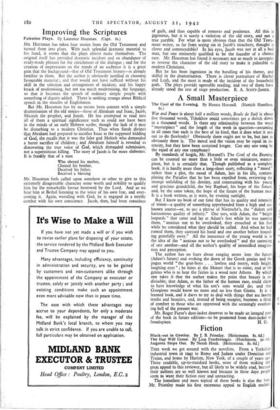A Small Masterpiece
War and Peace is about half a million words, Soule de Suif is about five thousand words, Tchekhov could sometimes get a sketch down in a thousand words. Is there any relationship between the word " masterpiece " and the length of the work in question—assuming in all cases that each is the best of its kind, that it does what it sets out to do flawlessly? Obviously there ought not to be, but just as obviously there is. The mood and the vision may be equal in in- tensity, but they have been sustained longer. Can any one -song be the equal of any one symphony?
By standards of length, Mr. Horsnell's The Cool of the Evening can be counted no more than a little or even miniature, master- piece, but it is certainly that. Though published as a complete book, it is hardly more than a long-short story, reflecting a " mood" rather than a plot, the mood of Adam, late in his life, contem- plating the Paradise that he has been expelled from, reviewing the strange unfolding of his destiny, and communing with hisyoung and gracious grandchild, the boy Raphael, his hope of the fruture, and, by the same token, the hope of the future of the human race. It is a book written, as it were, by evening sunlight.
But I know no book of our time that has its quality and intensity of vision—a quality of something apprehended from a high and un- known source—or, to use a phrp.se of Nietzsche's, the "dulcet and harmonious quality of infinity." One sees, with Adam, the " bright leopards " that came and lay at Adam's feet while he was naming them, " anxious not to be overlooked, they crouched at his feet while he considered what they should be called. And when he had named them, they caressed his hand and one another before bound- ing gratefully away." All the innocence of the young world is in the idea of the " anxious not to be overlooked" and the caressing of one another—and all the author's quality of intensified imagina- tion and perception.
The author has no fears about ranging aeons into the future (Adam's future) and evoking the dawn of the Greek genius and the pagan world " the goat-boys . . . lawless and merry, with bright, laughing eyes" ; he hints at the Mozart that is to come, and at the
genius who is to hear the fairies in a wood near Athens. By which one takes it that the author makes the point that beauty is in-
divisible; that Adam, as the father of the human race, could claim to have knowledge of what his son's sons would do; and that Giorgione would know no more and no less than Giotto. It is a learned book, and it dares to try to deal with things that are lasting truths and beauties, and, instead of being escapist, becomes a thing of comfort to those who are oppressed with the seemingly everlast- ing hell of the present war.
Mr. Roger Furse's dust-jacket deserves to be made an integral part of the book in future editions—to be promoted from dust-jacket to


























 Previous page
Previous page